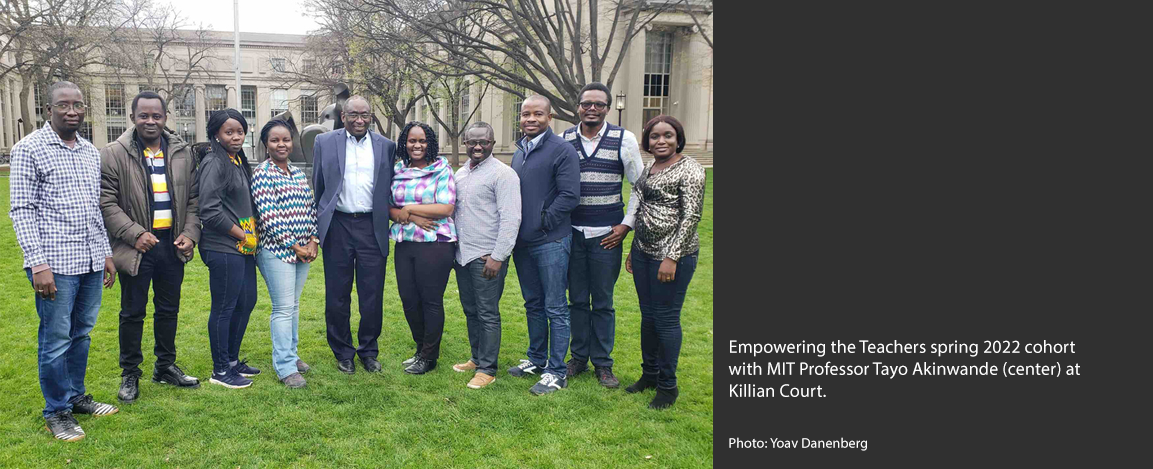“Empowering the Teachers” provides an immersive and innovative training experience for young African academics.
Empowering the Teachers (ETT), a program launched at MIT in 2011, is helping to change the face of engineering education in Nigerian universities. The program brings talented Nigerian academics at the postdoctoral level to MIT for a semester-long immersive experience, then sends them back out into the field to teach, research, and grow into influential leadership roles in their higher education system.
The 2024 ETT fellows have just arrived to campus and are quickly getting familiar with MIT. So far, 96 fellows have participated in the program. Amir Bature, a fall 2019 MIT-ETT fellow, is one of them. The senior lecturer at Bayero University in Kano says, “The first thing I learned at MIT is that every course needs a clear objective. If a student passes a course, they should also be able to use their knowledge to ultimately work in the industry as an engineer. It’s about more than just passing an exam.”
As a former British colony, Nigeria’s university structure remains based on the British system in which students’ entire grades are determined by a single final examination. Students learn theory for the first two years and don’t typically do hands-on engineering design work until their final year of university.
One key takeaway that Bature and his colleagues brought back to Nigeria is the approach of programming a course to offer continuous opportunities for learning and evaluation through weekly problem sets, labs, post-labs, and design projects.
Nigerian students are taking theory to practice
Back home, Bature structured his classes after what he had observed at MIT, pairing each lecture with a lab that allowed students to apply the concepts they learned in Python coding to design simulations.
Two of Bature’s students, Khadija Garo and Ruqayyah Nabage, went the extra mile, conceiving a project to innovate the Nigerian auto rickshaw known as a keke. The taxi-like vehicle transports workers and students throughout crowded city streets in northern Nigeria.
The keke only contains a steering and gear system. Bature’s students added a tracker system to allow drivers to know when they need to change their oil and fuel, and a GPS to offer a navigational system to make trips more efficient. The pair are now in talks with an investor about seed-funding to launch production.
Bature shares, “Being able to now teach in a way that takes students from theory to practice and seeing them solve real problems is something huge.”
Meaningful grant-making and collaborative research initiatives
ETT faculty director Tayo Akinwande, who is a professor of engineering and computer science at MIT, founded the program and personally mentors each cohort. He explains, “The program is extremely hands-on in nature.” Every fellow audits two MIT classes that parallel courses they have previously taught in Nigeria. This background mastery of subject material gives them the opportunity to make a thorough comparison between how the topic is taught at their home institutions versus at the Institute.
At MIT, fellows also learn how to choose research topics, write a successful grant proposal, and collaborate on projects with colleagues at other academic institutions.
For David Obada, a spring 2019 MIT-ETT fellow, that training was invaluable. Obada joined remotely from The Atlantic Technological University (ATU) in Ireland, where he is a postdoc and part of a teaching project.
Obada is the outreach coordinator of the Africa Centre for Excellence on New Pedagogies in Engineering Education at Ahmadu Bello University in Zaria, Nigeria. With World Bank funding, Obada and colleagues have developed a new pedagogy to improve collaborative work between students in peer-facilitated tutorials in material science. They presented their findings in June 2023 at the American Society for Engineering Education conference.
In Ireland, Obada is building a program to enable a Nigerian postgraduate student to spend a semester at ATU auditing how teaching is influenced by project-based learning. “That idea is a direct result of my time at MIT,” he says.
Making “a very big impact” in the industry
Since the beginning, ETT has been made possible through generous funding from TotalEnergies and coordinated by the MIT Center for International Studies (CIS). CIS supports and promotes global research and education at the Institute.
Evi Ifekwa, executive director of People and Country Services for TotalEnergies EP Nigeria, says, “Our motivation to get involved and sustain involvement has been identifying the opportunity to contribute to the modernization of engineering education in Nigerian universities.” She has watched with excitement as Nigerian female STEM pioneers have emerged from MIT-ETT and made strides in the field. “Examples are Toyin Odutola, a 2020 fellow who created Nigeria’s first hydrate loop, and Ronke Sakpere, a 2022 fellow who is equipping Nigerian women with computer programming skills,” Ifekwa reflects.
ETT managing director Yoav Danenburg has observed that fellows acquire a new, determined mindset over the course of their Institute semester. He says, “Weekly meetings and visits to MIT labs inspire our fellows to strive for change, and to very diligently push to implement what they've learned at MIT back at their home institutions — navigating local politics along the way.”
Victor Odumuyiwa was a fellow in the inaugural 2013 MIT-ETT cohort and is now director of NITHub at the University of Lagos. In the decade since MIT-ETT launched, he and his colleagues have risen in their careers to become the decision-makers and leaders — and also the problem-solvers. When Covid-19 hit, they pulled together to design an emergency ventilator toolkit from materials available in Nigeria.
He says, “I’ve definitely seen the birth of an active fellows network. We can have a very big impact in the industry in the next five to 10 years and deeply shift its course.”
Young academics in Nigeria have the opportunity to apply to become MIT-ETT fellows by submitting a written application. Finalists are interviewed in person by a committee in Nigeria twice each year. For more information visit: ett.mit.edu.




